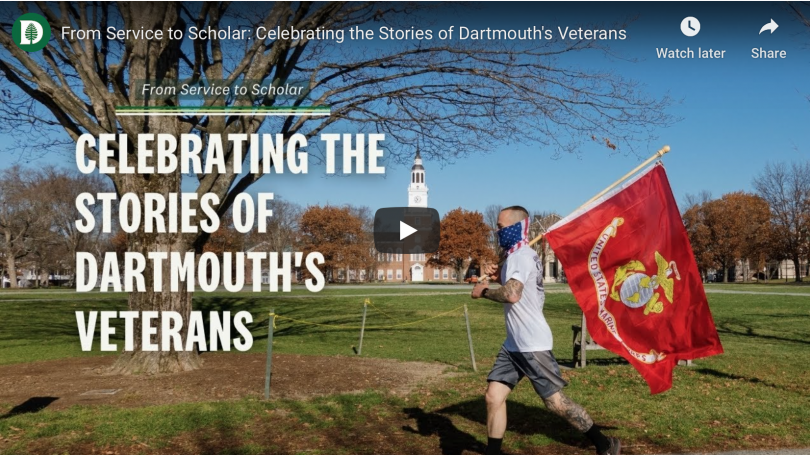Master of Arts in Liberal Studies (MALS) graduate student, Casey Carpenter knows the power of a good story. He harnessed that knowledge last month in a virtual program which he produced in celebration of Veteran's Day: From Service to Scholar: Stories of Dartmouth's Veterans.
The event featured six Dartmouth veterans and their stories, written and recorded over a series of workshops during the Fall term. Casey, a veteran of the United States Air Force, facilitated the program along with Kate Sullivan ('13, USMC Vet, DUSA President) as a way for them to take ownership of their narratives and to create a safe space to identify, express, and work with vulnerability.
"Veterans are non-traditional students with a unique shared experience when they head to Dartmouth," explains Casey. "For an array of reasons, many tied to those experiences, I've never met a Dartmouth veteran who did not suffer from some version of imposter syndrome, asking themselves "how the hell did I end up here?"
Throughout the fall term, six Dartmouth undergrad veterans met weekly to learn the art and craft of storytelling. Participants in the program (Arthur Lynch, '23, Colton Carlson, '23, Anthony Lenkievicz, '22, Andres Avalos, 22, and George Priest, '23) learned fundamental strategies of good storytelling such as understanding the narrative arc and identifying values in stories, and, crucially, how to be a good listener and allow themselves to be vulnerable.
"The toughest part of the process was being open and honest," states participant George Priest, '23. He was encouraged by the assistant dean for veteran students, Anne Hudak, to reach out to Casey. "She suggested I meet Casey and share my story," explains George, "and experience the opportunity to bond with other veterans."
Hearing from upperclassmen in the group as they shared their experiences is something Casey believes helped new students adjust to the rigors of Dartmouth academic life, particularly important during these socially distant times.
In addition to weekly group meetings, the participants also worked individually with Casey and Kate Sullivan ('13, USMC Vet, DUSA President), who also supported the initiative, to hone the stories and shape the narrative. Through close work, participants were encouraged to open up and have a sense of control over their trajectories, as well as their stories.
"We wanted them to become comfortable sharing their story with the broader community," says Casey, "shedding the abstract perception of what it means to be a Veteran and gives their unique, personal take on it."
The one-on-one sessions helped the individuals see more nuanced aspects of their stories that they might have missed otherwise.
"Casey asked the right questions which helped me develop my story," confirms George. "I was finding things about myself that I missed or that I didn't really pay attention to at first."
Casey came to the MALS program in 2018 with a passion for story-telling having participated and led a group of storytellers in Alaska, where he had been stationed while serving in the US Air Force. His partner Lisa Caldeira (D'07) also returned to Dartmouth to take a position in Alumni Relations while he completed his degree.
"I joined MALS at the age of 30 with a good sense of who I was and what I wanted to accomplish," Casey says. "The program gave me the gift of being able to explore and learn for the sake of exploring and learning. I took screenwriting, journalism, poetry, non-fiction, and fiction courses, and even spent a term – much to the chagrin of, Lisa – reading voraciously about clowns and the circus as I wrote circus-themed short stories."
During his time in the Upper Valley, Casey also co-founded a local story-creating organization Our Common Thread, ran storytelling events at the AVA Gallery in Lebanon, and Still North Bookstore in Hanover, and partnered with the Hartford Community Restorative Justice Center to run a narrative-based program for a small group transitioning out of prison and back into the community.
"It was an unbelievable chance to directly connect my academic studies with active applications and feedback. In the back of my mind, I had always wanted to do a Veteran-based program too," he says.
Since leaving Dartmouth in May this year, Casey, Lisa, and their dog Huxley have moved to Chicago where he works as a private contractor for the Air Force. He continues to design and run story-based programs at Dartmouth and in collaboration with other organizations. What's next? we asked him.
"I bit heavy into the pandemic trend of baking bread, and now bake 8-10 loaves a week (delivering many to family members) and I love learning the intricacies of a great sourdough loaf. Casey's Crusty Bread has become the name for my fake bakery, and we'll see where that avocation takes me."
In addition to baking bread, Casey will continue to run the Service to Scholar story-telling program each term and encourages anyone interested in participating to reach out to him.
